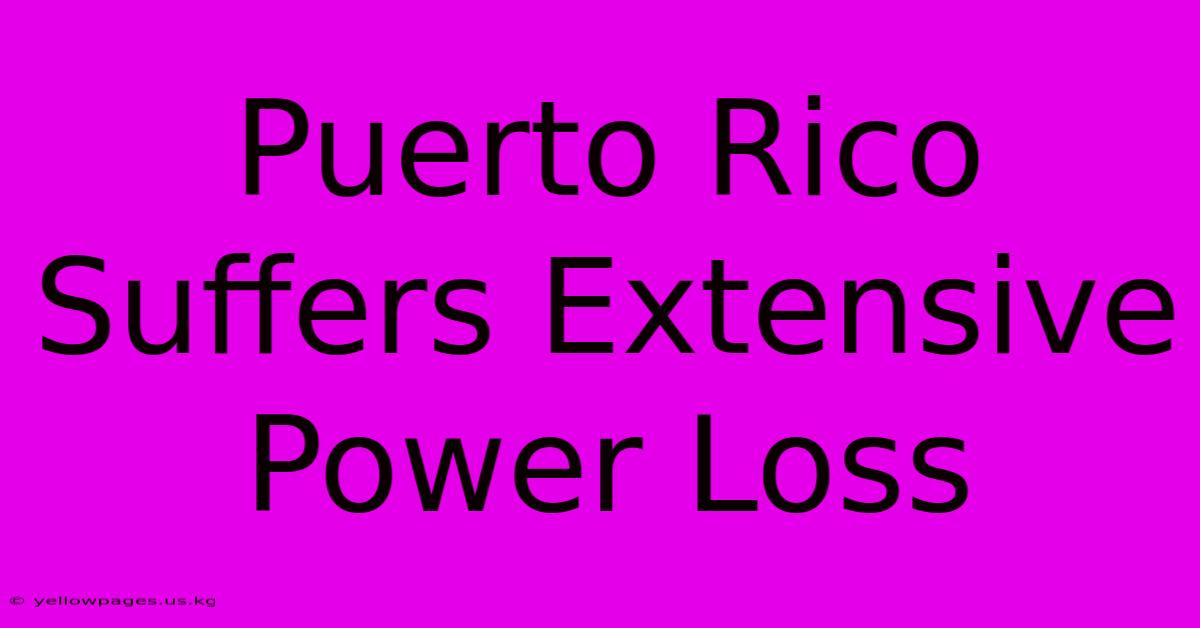Puerto Rico Suffers Extensive Power Loss

Discover more detailed and exciting information on our website. Click the link below to start your adventure: Visit Best Website trendingnews.us.kg. Don't miss out!
Table of Contents
Puerto Rico Suffers Extensive Power Loss: A Look at the Ongoing Crisis
Puerto Rico's power grid, a system already fragile after Hurricane Maria in 2017, is once again facing widespread outages. This ongoing crisis has left millions without electricity, highlighting the island's vulnerability and the urgent need for infrastructure improvements. This article explores the causes of the latest power failures, their impact on the population, and the ongoing efforts to restore power.
Causes of the Extensive Power Loss
The reasons behind the latest extensive power loss in Puerto Rico are multifaceted and complex, stemming from a combination of factors:
Aging Infrastructure: A Ticking Time Bomb
Years of neglect and underinvestment have left Puerto Rico's power grid in a state of disrepair. The infrastructure is outdated and struggles to cope with even relatively minor weather events. This aging system is highly susceptible to failures, making widespread outages a recurring problem. The lack of consistent maintenance and modernization has created a domino effect, where one failure can trigger a cascade of problems throughout the network.
Increased Demand and Limited Capacity
The island's growing population and increased energy consumption further strain the already fragile grid. The existing infrastructure simply isn't designed to handle the current demand, leading to overloads and frequent disruptions. This issue is exacerbated by the limited capacity for generating and distributing electricity.
Recent Weather Events: A Devastating Blow
While not solely responsible for the current crisis, recent weather events have undoubtedly contributed to the widespread outages. Strong winds and heavy rainfall can damage power lines and substations, exacerbating the existing problems. The island's geography also makes it particularly vulnerable to the effects of tropical storms and hurricanes.
Impact on the Population: A Ripple Effect of Hardship
The power outages have a profound and far-reaching impact on the lives of Puerto Ricans. Beyond the immediate inconvenience of darkness and heat, the lack of electricity affects:
- Healthcare: Hospitals and medical facilities rely heavily on electricity, and outages can lead to disruptions in critical care. This is particularly concerning for patients requiring life support or those in need of specialized treatment.
- Businesses: The lack of power significantly disrupts businesses, leading to lost revenue and potential job losses. Small businesses, often lacking backup power, are particularly vulnerable.
- Education: Schools and universities are forced to close, disrupting the education of students and adding to the already existing challenges in the education system.
- Daily Life: Basic necessities such as refrigeration, cooking, and communication are significantly impacted, leading to hardship and inconvenience for millions.
The Psychological Toll
The repeated power outages also take a significant psychological toll on the population, creating a sense of anxiety, frustration, and helplessness. The constant fear of another outage adds stress and uncertainty to daily life.
Efforts to Restore Power and Long-Term Solutions
The Puerto Rico Electric Power Authority (PREPA) and other agencies are working to restore power as quickly as possible. However, the scale of the problem and the condition of the grid make this a challenging task. Long-term solutions require a significant investment in upgrading and modernizing the infrastructure:
- Investing in renewable energy sources: Diversifying the energy supply by investing in solar, wind, and other renewable sources can reduce reliance on the vulnerable grid and improve energy security.
- Modernizing the grid: Upgrading transmission lines, substations, and other infrastructure is essential to improving reliability and resilience.
- Improving grid management: Implementing smart grid technologies can improve efficiency and help prevent widespread outages.
Stronger disaster preparedness and mitigation strategies are also critical. This includes improving emergency response systems and investing in backup power solutions for critical infrastructure.
Conclusion: A Call for Urgent Action
The ongoing power crisis in Puerto Rico underscores the urgent need for significant investment in the island's infrastructure. Addressing this challenge requires a comprehensive and long-term approach that involves modernizing the grid, investing in renewable energy sources, and improving disaster preparedness. The wellbeing and economic stability of Puerto Rico depend on it. Failure to act decisively will only prolong the suffering and hardship faced by the island's residents.

Thank you for visiting our website wich cover about Puerto Rico Suffers Extensive Power Loss. We hope the information provided has been useful to you. Feel free to contact us if you have any questions or need further assistance. See you next time and dont miss to bookmark.
Featured Posts
-
Jolie And Pitt Settle Long Divorce
Jan 01, 2025
-
Understanding The Us Polar Vortex
Jan 01, 2025
-
Illinois Vs South Carolina Where To Watch
Jan 01, 2025
-
Brangelina Divorce A Lengthy Process
Jan 01, 2025
-
College Football Playoff Schedule Update
Jan 01, 2025
